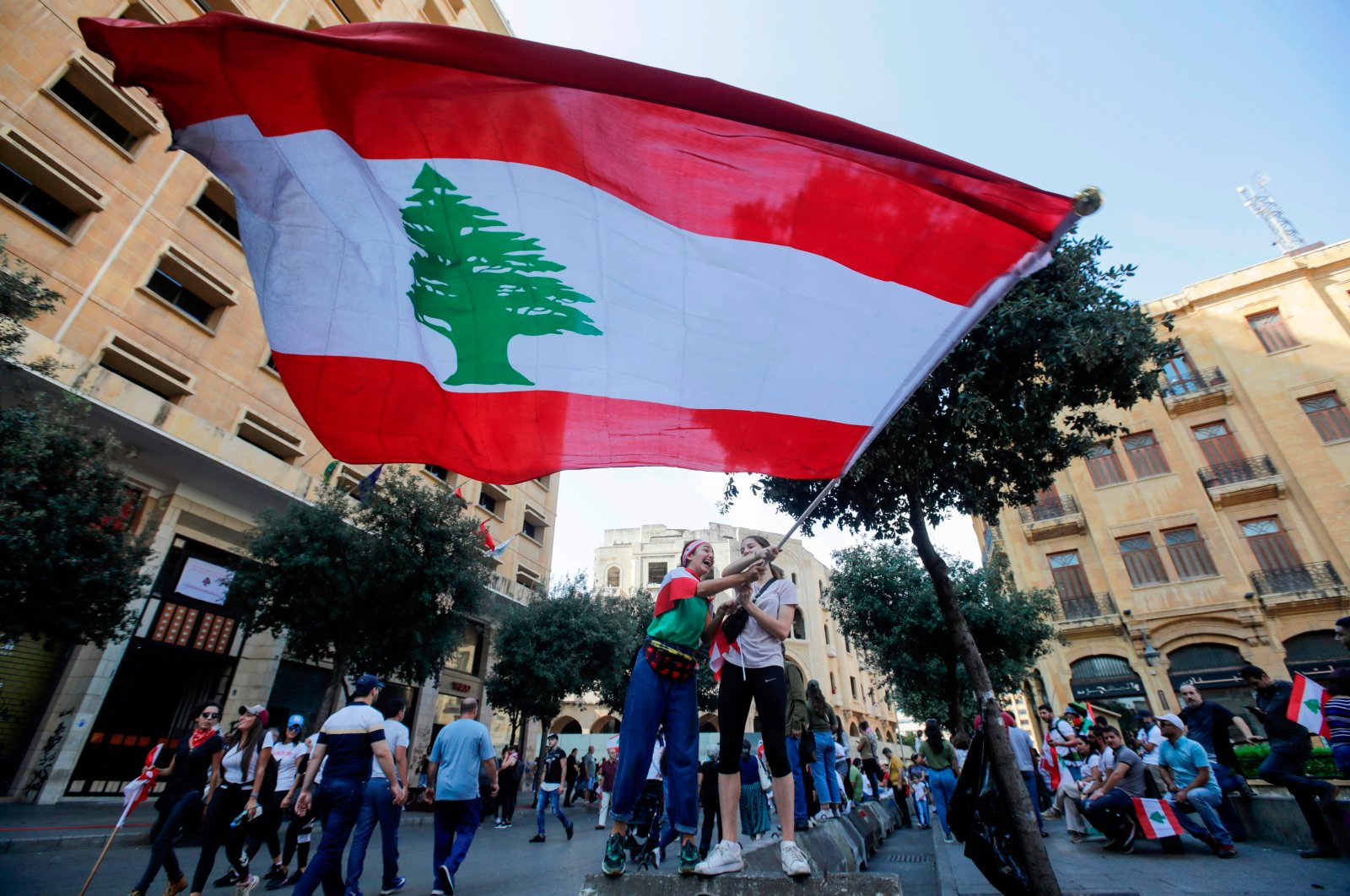
by thenational.ae -- Sunniva Rose -- Nine months after nationwide anti-government protests shook Lebanon, a few hundred protesters rallied around several anti-establishment political parties in the capital Beirut on Friday afternoon to revive their “revolution” as the country’s economic crisis worsens. “We must continue our revolution and change all this system,” said protester Mohaj Chaaban, who attended a rally in Beirut’s Martyr’s Square. “It’s 2020 in Lebanon and we don’t have electricity, we don’t have access to good schools, we don’t have a medical system, we have nothing,” Mr Chaaban told The National, referring to the country’s crumbling infrastructure that has worsened with the current economic crisis. A dollar crunch that caused the local currency to devaluate last summer pushed hundreds of thousands of Lebanese on to the streets on October 17 in what many supporters of the anti-government movement have dubbed the ‘October revolution’. But protests petered out after Hassan Diab’s government was formed in January with the promise that it would address the country’s failing economy. However, little to no reforms were implemented and the government has hit a brick wall in negotiations for a bailout with the IMF.
Meanwhile, half the Lebanese have been pushed into poverty, the local currency has lost over 80 per cent of its value on the black market, and fuel shortages have disturbed everyday life with electricity cuts for about 20 hours a day and disturbances in mobile network coverage. Both former Labour and Telecom Minister Charbel Nahas and former commander of the Lebanese army’s rangers regiment, retired brigadier general Chamel Roukoz, organised the protest in downtown Beirut, in an attempt to encourage the Lebanese to take to the streets once again. “Our project is easy,” said Mr Nahas in a speech, saying his party wanted a “peaceful transfer of power to a government with legislative powers for a period of 18 months with two tasks: (...) managing the crisis fairly and (...) establishing the legitimacy of the only real possible state in our country, which is the civil state.” Both Mr Nahas’ party, Citizens in a State, and Mr Roukoz, who was accompanied by a delegation of retired soldier, advocate for the end of Lebanon’s sectarian power-sharing system and for the transition to a “civil state” in which government jobs would be based on competence uniquely and not on sectarian affiliations.
by arabnews.com — CAIRO: Lebanon’s leading Christian cleric has ramped up his condemnation of Hezbollah saying it has always sidelined the Lebanese …
by Naharnet — Public Works Minister Michel Najjar announced on Wednesday an increase in public transportation fees as Lebanon’s economic crisis drags …

Reuters -- Writing by Ghaida Ghantous -- Lebanon wants to negotiate fuel imports with Kuwait to help Beirut cope with an economic and financial crisis, Lebanon’s internal security chief said in remarks published on Tuesday. Abbas Ibrahim told Kuwaiti newspaper Al Rai he had discussed the matter with Kuwaiti officials during a visit to the oil-exporting Gulf Arab state this week along with other “shared ideas” that could help alleviate Lebanon’s crisis. “We want to purchase 100% of our requirements from Kuwait without going through agents or companies looking to make a profit … this is a purely commercial matter and I hope there will be no obstacles to it,” Al Rai quoted Ibrahim as saying. He said the request would be raised to Kuwait’s ruler.
Khazen History


Historical Feature:
Churches and Monasteries of the Khazen family

St. Anthony of Padua Church in Ballouneh
Mar Abda Church in Bakaatit Kanaan
Saint Michael Church in Bkaatouta
Saint Therese Church in Qolayaat
Saint Simeon Stylites (مار سمعان العامودي) Church In Ajaltoun
Virgin Mary Church (سيدة المعونات) in Sheilé
Assumption of Mary Church in Ballouneh
1 - The sword of the Maronite Prince
2 - LES KHAZEN CONSULS DE FRANCE
3 - LES MARONITES & LES KHAZEN
4 - LES MAAN & LES KHAZEN
5 - ORIGINE DE LA FAMILLE
Population Movements to Keserwan - The Khazens and The Maans
ما جاء عن الثورة في المقاطعة الكسروانية
ثورة أهالي كسروان على المشايخ الخوازنة وأسبابها
Origins of the "Prince of Maronite" Title
Growing diversity: the Khazin sheiks and the clergy in the first decades of the 18th century
Historical Members:
Barbar Beik El Khazen [English]
Patriach Toubia Kaiss El Khazen(Biography & Life Part1 Part2) (Arabic)
Patriach Youssef Dargham El Khazen (Cont'd)
Cheikh Bishara Jafal El Khazen
Patriarch Youssef Raji El Khazen
The Martyrs Cheikh Philippe & Cheikh Farid El Khazen
Cheikh Nawfal El Khazen (Consul De France)
Cheikh Hossun El Khazen (Consul De France)
Cheikh Abou-Nawfal El Khazen (Consul De France)
Cheikh Francis Abee Nader & his son Yousef
Cheikh Abou-Kanso El Khazen (Consul De France)
Cheikh Abou Nader El Khazen
Cheikh Chafic El Khazen
Cheikh Keserwan El Khazen
Cheikh Serhal El Khazen [English]
Cheikh Rafiq El Khazen [English]
Cheikh Hanna El Khazen
Cheikha Arzi El Khazen
Marie El Khazen